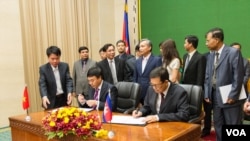The Vietnamese government has agreed to halt construction of roads, a police station and ponds near Cambodian border areas, following three days of border talks in Phnom Penh.
Cambodia had asked through diplomatic channels for an end to such construction, which has rankled many Cambodians on the border, who see it as a form of encroachment. Last month, a delegation of pro-opposition activists clashed with Vietnamese border security, heightening those concerns.
In a statement Friday, the Cambodian Ministry of Foreign Affairs said Vietnamese Deputy Foreign Minister Ho Xuan Son, who co-chaired the three-day border meetings this week, agreed to halt the construction of a road near Svay Rieng province and a police station near the border near Kandal province, and would fill in three of eight ponds near Ratanakkiri province. The other five ponds will be visited and discussed by joint border committee members, the statement said.
Foreign Ministry spokesman Chum Sounry said the promises from Vietnam followed a request by the ministry’s secretary of state, Long Visalo, who joined this week’s meetings. “We are working on it,” he said.
Var Kim Hong, chairman of the Cambodian Border Committee, could not be reach for comment Friday.
Talks with Vietnam over border issues ended Thursday with little other tangible results. A brief statement issued after the talks said the group had agreed that border demarcation “is very complicated” and that each side is working hard toward agreeing on the border, which now stands at 85 percent marked.
Meanwhile, everyday Cambodians say they fear the government is not doing enough to prevent encroachment by Vietnam. Border issues are a major political flashpoint, with many Cambodians still bitter about a 10-year occupation of Cambodia by Vietnam following the ouster of the Khmer Rouge.
Many people are concerned that the map currently in use for border talks was made by Vietnam and is therefore suspect.
“Our land will be lost to Vietnam if we use this map,” Bun Thoeun, a tuk-tuk driver in Phnom Penh, told VOA Khmer this week, echoing concerns of other people interviewed in the capital. “I’ve never seen our leaders discuss anything with Vietnam. Vietnam co do whatever, arbitrarily, and they seem not to get angry with Vietnam.”
However, Sok Eysan, a spokesman for the ruling Cambodian People’s Party, said the government has not weakened its stance with Vietnam and is working to “protect territory and national independence.”
Opposition leader Sam Rainsy, head of the Cambodia National Rescue Party, told VOA Khmer that multiple commissions, as well as high-tech mapping technology, are needed to resolve the border dispute. “The territory issue doesn’t belong to any political party,” he said, “but it is for all of us.”




